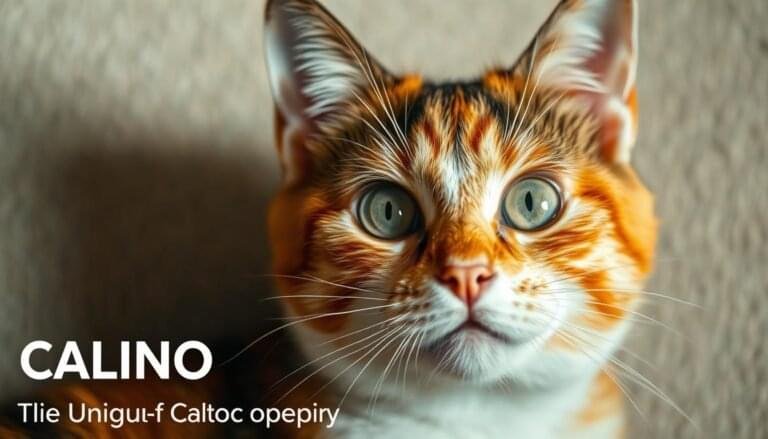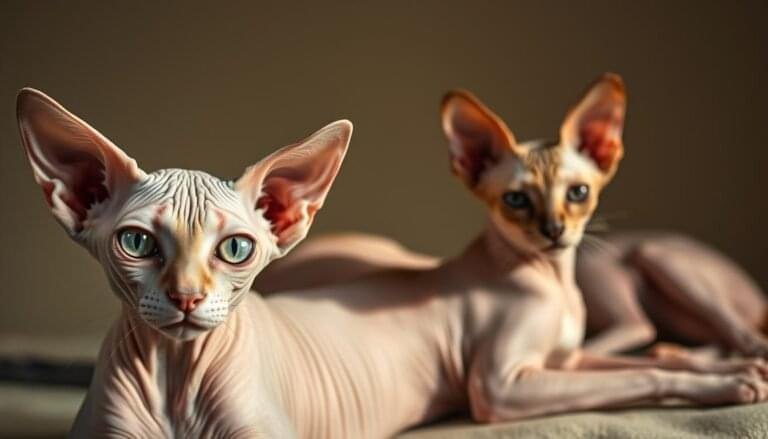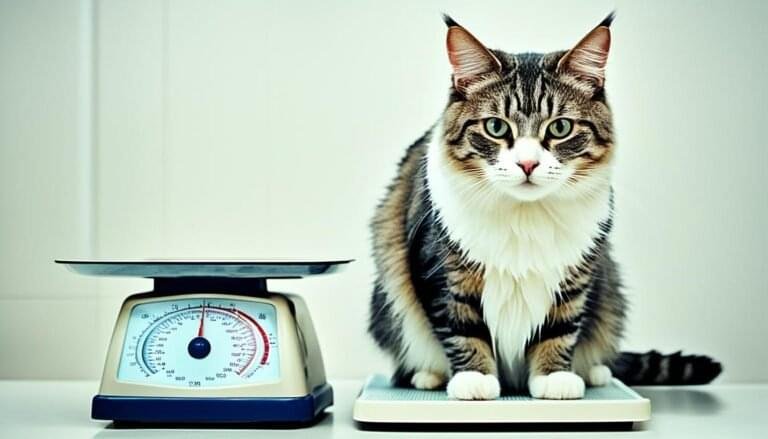When are cats considered seniors? Did you know that cats can live well into their late teens and even early twenties? With their independent nature and graceful demeanor, cats are cherished companions for many pet owners. But when does a cat transition from being an adult to a senior? Understanding the age at which cats are considered seniors is crucial for providing them with the appropriate care and attention in their golden years.
Many cats show age-related physical changes between 7 and 10 years old, and most will have by about 12 years old. It is generally accepted that one “cat year” is equal to roughly four human years after the first year. Cats can be considered seniors at around 11 years old, and if they live beyond 15 years, they are considered “super-seniors.”
Key Takeaways:
- Cats can live well into their late teens and even early twenties.
- Many cats show age-related physical changes between 7 and 10 years old.
- Cats are considered seniors at around 11 years old.
- Cats who live beyond 15 years are considered “super-seniors.”
Signs of Aging in Cats
As cats age, they go through various physical and behavioral changes that indicate the signs of aging. These changes can be categorized into two main areas: physical changes and behavioral changes.
Physical Changes
Physical changes in aging cats can manifest in several ways:
- Less effective grooming: Aging cats may struggle with grooming themselves as efficiently as they did when they were younger. This can result in a less well-kept appearance and matting of the fur.
- Thick and brittle claws: The claws of aging cats may become thicker and more brittle, making them prone to breakage.
- Hazy eyes: Older cats may develop a cloudiness in their eyes, which can affect their vision.
- Unintentional weight loss or gain: Changes in weight can be a sign of underlying health issues in aging cats. Some cats may lose weight despite maintaining a regular appetite, while others may experience weight gain.
- Arthritis or joint disease: Aging cats are more susceptible to arthritis and joint disease, which can cause discomfort and mobility issues.
- Sleep changes: Older cats may sleep more frequently or experience changes in their sleep patterns.
- Loss of hearing: Hearing loss is common in aging cats and can affect their response to sounds and interactions.
- Cognitive issues: Some aging cats may experience cognitive decline, resulting in disorientation, confusion, and changes in behavior.
Behavioral Changes
Aging cat behavior can undergo significant changes as well:
- Litterbox accidents: Older cats may experience difficulties with using the litterbox consistently, leading to accidents outside of the designated area.
- Increased meowing: Some aging cats may start meowing more frequently, possibly as a result of discomfort or communication with their owners.
- Aggression: Cats can become more aggressive as they age, often due to underlying pain or disease. This behavior change should be addressed promptly with the help of a veterinarian.
It’s important for cat owners to be aware of these signs of aging in their feline companions. By recognizing these changes, you can take the necessary steps to provide the best care and support for your aging cat’s well-being.
Caring for Older Cats
To keep older cats healthy, it’s important to observe changes in behavior and appearance, provide proper grooming, monitor weight and nutrition, create a comfortable home environment, and schedule regular vet visits.
Grooming: Brushing their fur, trimming their claws, and brushing their teeth can help with grooming.
Nutrition: Adjusting their diet and ensuring easy access to food and water can help with nutrition.
Environment: Providing a warm and stress-free environment, along with mental and physical stimulation, is beneficial.
Vet Visits: Regular vet checkups are crucial for early detection of any health issues.
When it comes to grooming older cats, regular brushing is important to keep their fur clean and free from matting. Trimming their claws regularly can prevent overgrowth and discomfort. Brushing their teeth helps promote dental health and prevents periodontal disease, which is common in senior cats.
In terms of nutrition, it’s essential to adjust their diet to meet their changing needs. Older cats may require specific diets that are lower in calories and more easily digestible. It’s important to ensure they have easy access to fresh food and water throughout the day.
Creating a comfortable home environment is crucial for the well-being of older cats. Providing cozy beds and warm blankets helps them stay comfortable. It’s also important to minimize stress by maintaining a consistent routine and providing mental and physical stimulation through playtime and interactive toys.
Regular vet checkups are vital for senior cats. These visits allow the veterinarian to assess their overall health, conduct necessary tests, and detect any potential health issues early on. Monitoring weight and nutrition, as well as addressing any changes in behavior or appearance, can help prevent and manage age-related illnesses.
Health Issues in Senior Cats
As cats age, they become more susceptible to certain health conditions that can impact their overall well-being and quality of life. It’s important for cat owners to be aware of these potential health issues and take proactive measures to ensure their senior feline companions receive the necessary care.
Dental Disease
Dental disease is a common problem in senior cats and can cause significant discomfort and pain. Poor oral health can lead to gum disease, tooth decay, and even tooth loss. Regular dental care, including professional cleanings and daily toothbrushing, can help maintain healthy teeth and gums in senior cats.
Arthritis
Arthritis is another prevalent condition among senior cats. The degeneration of joint cartilage can cause stiffness, pain, and decreased mobility. Providing pain management strategies, such as anti-inflammatory medications and appropriate exercise, can help alleviate discomfort and enhance their quality of life.
Kidney Disease
Kidney disease is a common ailment in senior cats and can lead to kidney failure if left untreated. Regular monitoring of kidney function through blood and urine tests is crucial for early detection and appropriate management. Special diets and medication can help slow the progression of the disease and support kidney health.
Hyperthyroidism
Hyperthyroidism is a condition characterized by an overactive thyroid gland. It can cause weight loss, increased appetite, restlessness, and other symptoms. Treatment options include medication, radioactive iodine therapy, or surgery, depending on the severity and individual circumstances.
Inflammatory Bowel Disease
Inflammatory bowel disease (IBD) is a chronic condition that affects the digestive system of senior cats. It can cause vomiting, diarrhea, weight loss, and poor appetite. Dietary modifications, medication, and regular veterinary checkups are essential for managing IBD in senior cats.
Diabetes
Diabetes is a metabolic disorder that can develop in senior cats, resulting in abnormal blood sugar levels. Weight management, regular exercise, and a diabetes-friendly diet are key components in managing this condition. Insulin therapy or oral medications may also be necessary to regulate blood sugar levels.
Cancer
Cancer is a serious health concern in senior cats. It can manifest in various forms, such as lymphoma, leukemia, or mammary tumors. Early detection and prompt treatment, such as surgery, chemotherapy, or radiation, can significantly improve survival rates and maintain a good quality of life.
Cognitive Dysfunction Syndrome
Cognitive dysfunction syndrome (CDS), also known as feline dementia, is a condition that affects the cognitive abilities of senior cats. Symptoms may include disorientation, confusion, increased vocalization, and changes in litter box habits. Environmental enrichment, mental stimulation, and specific medications can help manage the symptoms of CDS and improve the overall well-being of senior cats.
Regular veterinary checkups and close monitoring of senior cats’ behaviors and well-being are crucial in identifying and managing these health issues effectively. By understanding the potential health risks and providing appropriate care, cat owners can promote the feline senior health and wellness of their beloved furry companions.
How a Veterinarian Can Help
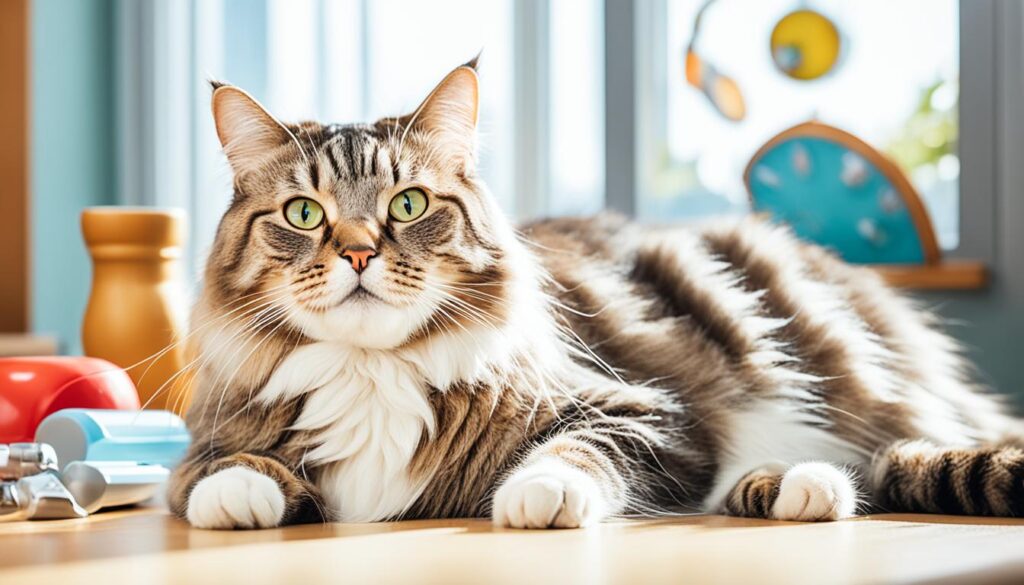
Veterinarians play a crucial role in ensuring the health and well-being of senior cats. Regular wellness checks and routine exams are essential for monitoring a cat’s overall health and detecting any potential issues early on. By partnering with a trusted veterinarian, cat owners can ensure that their furry companions receive the best care possible.
Wellness checks allow veterinarians to assess a senior cat’s health comprehensively. During these visits, the vet will conduct a thorough physical examination, checking vital signs, assessing mobility, and examining the cat’s eyes, ears, teeth, and coat. By conducting these regular check-ups, veterinarians can identify any abnormalities, such as lumps, bumps, or changes in behavior, that might indicate underlying health problems.
In addition to physical exams, veterinarians may recommend blood work and other diagnostic tests to assess a senior cat’s health. Blood tests can provide valuable information about organ function, hormone levels, and blood cell counts, helping to detect potential health issues before they become serious. Monitoring blood pressure is also crucial for senior cats, as high blood pressure can lead to heart, kidney, and eye problems.
Vets can provide valuable guidance on various aspects of senior cat care, including diet, grooming, and managing specific health conditions. As cats age, their nutritional needs change, and veterinarians can recommend appropriate diets that support optimal health and vitality. They can also provide advice on senior cat grooming, such as how to care for their coat and trim their claws properly.
When senior cats are diagnosed with specific health conditions, veterinarians can guide owners through the management process. They can provide information on medications, supplements, and other treatments that can help alleviate symptoms and improve the cat’s quality of life. Regular follow-ups with the veterinarian allow adjustments to treatment plans as needed.
Keeping Senior Cats Healthy at Home
As senior cats require additional care, it’s crucial to ensure they have a healthy and comfortable environment at home. Here are some essential tips to keep your senior cat in optimal health:
Maintain Proper Nutrition
Senior cat nutrition plays a vital role in their overall well-being. Consult with your veterinarian to determine the best diet for your senior feline companion. Senior-specific diets are recommended as they provide the necessary nutrients tailored to their age and health requirements. Ensuring easy access to fresh food and water is also important to keep them hydrated and well-nourished.
Create a Warm and Comfortable Environment
Senior cats often seek warmth and comfort. Provide cozy resting places for your cat, such as soft bedding or heated cat beds. Make sure the environment is warm and draft-free, especially during colder months. This helps prevent discomfort and keeps them relaxed and content.
Regular Grooming
Grooming is essential for the overall health and wellness of your senior cat. Regular grooming sessions help maintain their coat’s condition and prevent matting. It also allows you to check for any lumps, bumps, or skin issues that may require veterinary attention. Additionally, grooming promotes bonding and provides a soothing experience for your cat.
Monitor Weight Changes
Weighing your senior cat regularly can help you monitor their weight and overall health. Unexplained weight loss or gain may indicate underlying health issues that require veterinary intervention. Keep track of their weight and consult your veterinarian if you notice any significant changes.
Observing your senior cat’s behavior, keeping their environment comfortable, providing the right nutrition, and maintaining regular grooming practices are crucial for their well-being. By making these adjustments at home, you can help ensure that your senior cat enjoys a happy and healthy life.
Importance of Regular Vet Visits
Regular vet visits play a critical role in maintaining the health and well-being of senior cats. As cats age, they become more susceptible to various health issues, and early detection is key to effective treatment. Here are some reasons why regular vet visits are essential for senior cat health.
Complete Physical Exams for Cats Over 7 Years Old
Once cats reach the age of 7, it is recommended to have a complete physical exam every six months. These exams allow the veterinarian to assess the overall health of your senior cat, identify any potential issues, and provide appropriate care.
Blood Work and Diagnostic Tests
In addition to physical exams, blood work and diagnostic tests are often necessary for senior cats. These tests may include thyroid level checks, complete blood counts, urinalysis, and heartworm screening. Routine blood pressure checks and additional diagnostic tests may also be advised depending on your cat’s individual needs.
Observing Changes in Behavior
Senior cats may exhibit subtle changes in behavior that could indicate underlying health problems. By closely monitoring your cat’s behavior and promptly contacting a vet if you notice any changes, you can catch potential health issues early and provide timely intervention.
Regular vet visits are essential for maintaining the health and happiness of your senior cat. These visits allow for comprehensive examinations, necessary tests, and proactive care. By prioritizing regular vet visits, you are taking proactive steps to ensure that your senior cat receives the best possible care and lives a long and healthy life.
Observing Changes in Senior Cats
As our cats age, it’s essential to pay attention to any physical or behavioral changes that may indicate underlying health issues. By observing and understanding these changes, we can provide the necessary care and support to ensure our senior feline friends live their best lives. Here are some key signs to look out for:
Weight Changes
Monitor your cat’s weight closely. Sudden weight loss or gain can be indicative of various health conditions, including thyroid problems, diabetes, or organ dysfunction. Regular weigh-ins can help track any fluctuations.
Agility and Playtime
Notice if your cat’s movements become less graceful or if they show a decrease in activity level during playtime. Arthritis or joint issues can cause stiffness and reduced mobility, affecting their usual agility.
Sleep Patterns
Changes in sleep patterns, such as increased or decreased sleep, can be a sign of underlying health issues or discomfort. Keep an eye on any significant alterations in your cat’s sleep routine.
Disorientation
If your senior cat appears disoriented, gets lost in familiar surroundings, or seems confused, it may indicate cognitive dysfunction or neurological problems. These changes should be promptly addressed by a veterinarian.
Grooming
Notice if your cat’s grooming habits change. Aging cats may have difficulty reaching certain areas or lose interest in grooming altogether. This can lead to matted fur, skin issues, or poor coat condition.
Behavior
Pay attention to any significant changes in behavior, such as increased aggression, hiding, or decreased tolerance to environmental changes. These behavioral changes could be a response to pain, stress, or other health concerns.
To effectively monitor your cat’s health, consider regular weigh-ins and using video cameras to observe their behavior when you’re not around. These tools can provide valuable insight into your senior cat’s well-being and help you identify potential health issues early on.
| Signs of Aging in Cats | Cat Health Tips |
|---|---|
| Weight changes | Monitor weight closely and seek veterinary advice if there are significant fluctuations. |
| Agility and playtime | Notice any changes in mobility and adapt playtime activities accordingly. |
| Sleep patterns | Watch for any disruptions in sleep patterns and consult a veterinarian if necessary. |
| Disorientation | Address any signs of confusion or disorientation with professional guidance. |
| Grooming | Provide assistance with grooming and consult a vet if there are issues. |
| Behavior | Observe changes in behavior and seek veterinary advice if there are concerning alterations. |
Best Practices for Senior Cat Care
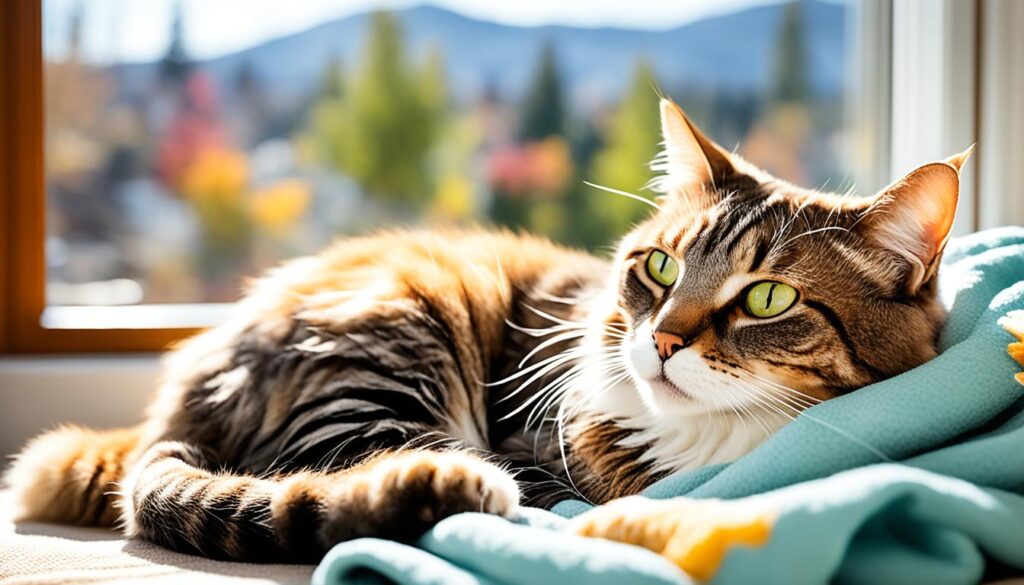
When it comes to senior cat care, there are several best practices that can help ensure the health and well-being of your beloved feline companion. By creating a cat-friendly environment, monitoring their health, providing proper nutrition, and adapting routines to their needs, you can help your senior cat thrive in their golden years.
Creating a Cat-Friendly Environment
- Ensure easy access to food and water to promote hydration and proper nutrition.
- Provide warm and comfortable resting places, such as cozy beds or heated blankets, to support their aging bodies.
- Offer scratching posts and litter boxes that are easily accessible, taking into account any mobility issues they may have.
- Set up a quiet and peaceful space where your senior cat can retreat and relax.
Monitoring Health
- Observe your senior cat’s behavior and appearance for any changes that may indicate health issues.
- Schedule regular vet visits to proactively address any potential health concerns and ensure early detection of any problems.
- Monitor weight and nutrition to prevent obesity or malnutrition, which can impact their overall health.
- Keep an eye out for signs of pain or discomfort, such as limping or reluctance to jump.
Providing Proper Nutrition
- Consult with your vet to determine the best diet for your senior cat’s specific needs.
- Choose a high-quality senior cat food that is specially formulated to meet their nutritional requirements.
- Consider adding supplements, such as joint support or omega-3 fatty acids, to promote joint health and reduce inflammation.
- Ensure fresh water is always available to prevent dehydration.
Adapting Routines
- Establish a regular grooming routine to keep your senior cat’s coat clean and free from mats.
- Provide mental and physical stimulation through playtime or puzzle toys to keep their minds sharp and bodies active.
- Adjust exercise routines to accommodate any limitations or mobility issues they may have.
- Consider installing ramps or stairs to help your senior cat navigate furniture or stairs more easily.
By following these best practices for senior cat care, you can ensure that your furry companion receives the love, attention, and support they need to live a happy and healthy life as they age.
Conclusion
Caring for senior cats requires a deep understanding of the signs of aging and a commitment to providing comprehensive care. By observing changes in behavior and appearance, owners can detect potential health issues early and take appropriate action. Proper grooming and nutrition are essential for the overall wellness of senior cats.
Scheduling regular vet visits is critical to maintaining senior cat health. Veterinarians play a vital role in monitoring a cat’s well-being, conducting necessary diagnostic tests, and providing expert guidance on diet and health management.
By following best practices for senior cat care, such as creating a cat-friendly environment and adapting routines to their needs, owners can ensure their beloved feline friends enjoy a healthy and comfortable life as they enter their golden years.
FAQ
When are cats considered seniors?
What are the signs of aging in cats?
How do I care for older cats?
What are common health issues in senior cats?
How can a veterinarian help with senior cat health?
How do I keep senior cats healthy at home?
How important are regular vet visits for senior cats?
What changes should I observe in senior cats?
What are the best practices for senior cat care?
References
| International Cat Association (TICA) | https://www.tica.org/ |
| The Cat Fanciers’ Association (CFA) | https://cfa.org/ |
| World Cat Federation (WCF) | https://www.wcf-online.de/ |
| Fédération Internationale Féline (FIFe) | https://www.fifeweb.org/ |

